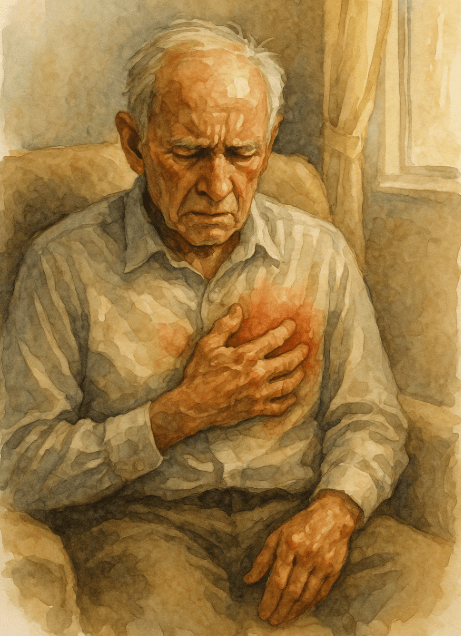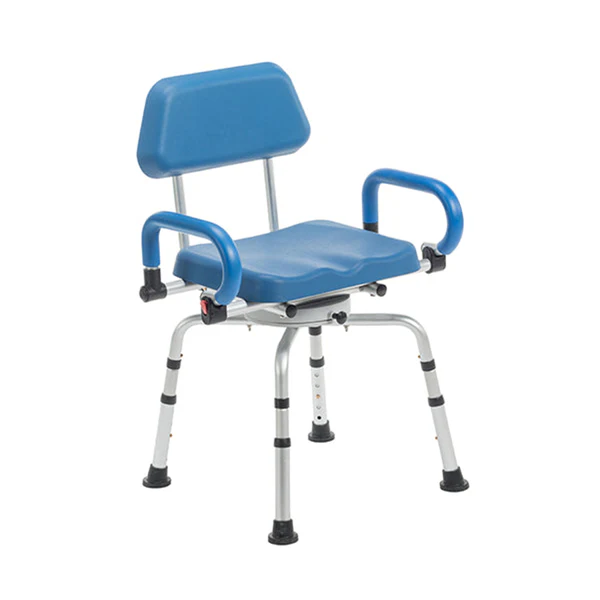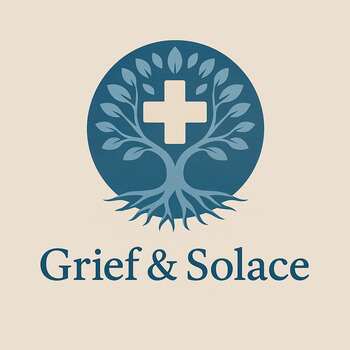Grieving Congestive Heart Failure: Counting Heartbeats While Waiting for Goodbye
Grief with congestive heart failure comes slow and heavy—counting every shallow breath, every weak heartbeat, knowing the body cannot carry the spirit forever.

This post blends real grief with grounded knowledge. It isn’t clinical. It isn’t distant. It’s meant to sit beside you—not above you. The story you’ll read is meant to reflect what so many feel when living through or witnessing this condition: confusion, exhaustion, and quiet forms of courage.
If what you read feels familiar, please speak with your doctor. Your pain deserves more than silence.
His Heart Was Big Enough for Everyone but Himself
He was the kind of man who offered you the last slice of pizza, the coziest blanket on a chilly evening, and the strongest umbrella when the rain poured down. People often remarked that his heart was too big, and as it turned out, they were right.
At first, it started with a subtle tiredness. He began to sit down more frequently, leaning against walls while waiting in lines. He brushed it off as age, as the weather, as nothing at all. But we noticed how his shoes seemed to tighten by evening, the way he paused to catch his breath after tying them, and how he stopped singing along to the music in the car.
🧠 Symptoms:
- Shortness of breath: Especially during activity or when lying down
- Fatigue and weakness
- Swelling: In legs, ankles, feet, or abdomen
- Rapid or irregular heartbeat
- Persistent cough: May produce white or pink mucus
- Sudden weight gain: From fluid retention
- Nausea or loss of appetite
- Difficulty concentrating or decreased alertness
Then came the quiet and clinical diagnosis: “Congestive heart failure.” It sounded as if it could be managed, something you could live with. However, living with it felt like drowning slowly in his own body, a constant struggle as fluid pooled where he once found breath.
He despised the machines surrounding him, the pills lined up like little soldiers on the kitchen counter, the daily weigh-ins that felt like a countdown to an uncertain future. Salt became a foe, as did stairs.
Yet, despite it all, he continued to smile, to tell jokes, and to ask if we were okay. Even when we found him on the bathroom floor, dizzy and soaked in sweat. Even during the blurred ER visits. Even when the doctors said, “He’s stable, for now.”
Complications:
- Kidney failure: From reduced blood flow
- Liver damage: Due to fluid overload
- Heart valve dysfunction
- Sudden cardiac arrest
- Pulmonary hypertension
- Sleep difficulties: Including apnea and nighttime breathing trouble
- Medication side effects: From long-term drug regimens
Causes:
- Coronary artery disease
- High blood pressure (hypertension)
- Heart valve damage
- Cardiomyopathy: Disease of the heart muscle
- Myocarditis: Inflammation from viral infection
- Congenital heart defects
- Heart rhythm disorders (arrhythmias)
- Chronic illnesses: Diabetes, HIV, thyroid disorders, iron/protein buildup
No one ever explains how delicate that line is, how quickly stable can flip to sirens, how a simple nap can morph into a coma, or how “I’m fine” can suddenly turn into “He didn’t wake up.”
He gave everything he had…to work, to us, to anyone who needed an extra bit of compassion. And when his own heart finally pleaded for something in return, he didn’t know how to reach out for help.
One night, while holding his hand when he was too weary to pretend, he confessed, “I’m scared I won’t be me anymore. That this heart won’t remember who I was.” I assured him, “It will. Because you put yourself into all of us.”
He lived as if he weren’t dying, until he could no longer sustain that facade. Yet, even then, he showed us how to love louder than fear, how to keep moving on tired legs, and how to allow a failing heart to still feel full.
Prevention:
- Manage chronic conditions: Hypertension, diabetes, cholesterol
- Healthy lifestyle:
- Regular exercise
- Heart-healthy diet
- Smoking cessation
- Alcohol moderation
- Routine screenings and checkups
- Treat infections promptly
- Avoid illegal or cardiotoxic drugs
Risk Factors:
- High blood pressure
- Coronary artery disease
- Diabetes and obesity
- History of heart attacks
- Sleep apnea
- Smoking and alcohol use
- Certain medications
- Family history of heart disease
“The heart didn’t quit all at once…it just forgot how to beat for him… not everyone else.”
📘 Diagnosis & Treatment
Diagnosis:
- Physical exam and history
- Blood tests: Including BNP or NT-proBNP
- Chest X-ray
- Electrocardiogram (ECG)
- Echocardiogram: Key to evaluating heart structure and function
- Stress testing
- CT/MRI scans: For detailed imaging
- Coronary angiogram: If coronary disease is suspected
Treatment:
- Medications:
ACE inhibitors: Reduce blood pressure and heart strain - Beta blockers: Slow heart rate and improve function
- Diuretics: Remove excess fluid
- Aldosterone antagonists: Protect heart and reduce fluid retention
- Digoxin: Strengthens heart contractions
- Vasodilators: Improve blood flow
Lifestyle Changes:
- Stop smoking
- Limit sodium and fluids
- Follow a DASH or Mediterranean-style diet
- Exercise safely under medical guidance
- Track weight daily to detect fluid buildup
- Limit alcohol and avoid binge drinking
Surgical & Device Interventions:
- Coronary artery bypass surgery
- Heart valve repair/replacement
- Implantable cardioverter-defibrillators (ICD): Prevent sudden death
- Cardiac resynchronization therapy (CRT): Improves heart rhythm
- Ventricular assist devices (VADs): Supports pumping in severe cases
- Heart transplant: For end-stage failure when all else fails
I know this is heavy, and I understand that the road ahead may feel like a tangle of loss and unanswered questions. But please hear this: you are not broken because you are hurting; you are not weak because you are afraid. You are living through something real, and survival itself is a kind of grace. You are allowed to struggle, you are allowed to hope, and you are allowed to not have all the answers today. Whatever comes next, you do not face it empty-handed; you carry every moment of love that shaped you, and that will always be enough to keep going.
🎀 Gifts to help With Congestive Heart Failure
🏥 Everyday Comforts for Everyday Battles
Managing Congestive Heart Failure often means needing a little extra help.
Sometimes it’s about restoring dignity, ease, or simply getting through the day with less pain.
These carefully chosen tools aren’t just items; they’re small bridges back to living.
This section is about finding practical support, never shame.
Lightweight Folding Shower Chair – Safety for When the Heart Can’t Keep Up
With CHF, even showering can feel like climbing a mountain. Shortness of breath, dizziness, and fatigue turn basic tasks into cardiac strain. This folding shower chair provides a secure place to rest mid-routine, reducing the risk of falls while respecting the body’s limits. Lightweight, non-slip, and made for daily use, because pacing yourself shouldn’t mean skipping care.
🌿 Paths to Healing Beyond the Map
Sometimes traditional medicine isn’t enough.
If you’re exploring gentle, alternative options to help with Congestive Heart Failure,
you might find comfort in plant-based compounds like **CBD or CBG**.
*This section is not medical advice, just a door left open.*
USA Medical Heart & Circulation Support Pack – Gentle Aid for the Weary Cardiovascular System
Congestive heart failure doesn’t just affect the heart—it changes how you live. This support pack blends circulation-boosting botanicals, CBD, and natural anti-inflammatories to gently assist blood flow and reduce tension. It won’t reverse CHF. But it can offer subtle support for a body always working overtime. For the days when walking to the mailbox feels like too much.
Need a Different Path Forward?
Every journey through grief looks different. Choose the next step that speaks to where you are now:
When You're Ready to Start Healing
Healing doesn’t mean forgetting.
It means finding small ways to carry your grief with strength and grace.
These are the stories, tools, and gentle steps to begin walking forward…at your own pace.
When You're Still in the Thick of It
Sometimes healing feels like a lie.
If you’re not ready to move on…if the pain still roars louder than the world wants to hear…this is the place where you’re allowed to feel it.
No sugarcoating. No pretending. Just truth.
When You're Holding on to Who’s Still Here
Grief reminds us to love louder.
If someone you love is still with you, this is your place to celebrate them, honor them, and create new memories while there’s still time.
Joy and sorrow can live side by side.






